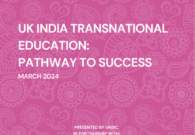Future of India’s Education System: How UK & India can Partner to Build it?
Kevin McCole, UKIBC COO, write his thoughts on UK-India collaboration in the Education sector in his latest Op-ed published in the Education Times India.

As India is gradually moving from being a net consumer of knowledge to becoming a net producer, the New Education Policy that is currently being drafted by the MHRD, assumes great significance. The new policy can be a step forward in easing unprecedented pressure owing to India’s high domestic demand and evolving needs of its businesses – domestic as well as foreign. It is estimated that by 2030, in order to meet its enrolment ratio target of 30%, India will need at least another 1,500 new HE institutions to cater to about 140 million people in the college going age. More importantly, with increasing global integration this workforce will have to have right kind of generic skills and sufficient industry exposure to be successful.
Providing sufficient and quality education has been Indian government’s larger objective under National Policy on Education 1986, which was later reviewed in 1992. While it is important to maintain the unique value system outlined in the original policy, there is a need to further enhance quality parameters in the upcoming policy by taking actionable steps in bridging academia-industry gap, having more activity-based learning, embedding technological innovation and exchanging ideas across borders. At the same time, the role of private sector and regulations enabling it should be looked into, given the fact that close to 60% of tertiary enrolments in the country is in privately owned institutions.
Universities in the UK, owing to their world class curriculum and pedagogy, have long-storied tradition in excellent higher education. And they are committed to supporting India’s journey to building an education system that is innovative, inclusive and is at international standards of quality.
The new policy, being drafted after global stakeholder consultations, will do well to recognise qualifications earned abroad – a long held demand of Indian students who have undertaken articulation, pathway programmes or 1-year masters degree in a foreign country. After a long slump, the number of students going to the UK for higher education increased by 27% last year. With prospect of UK qualifications being recognised, this percentage is likely to go several notches up in future.
In addition to recognising qualifications, the new regime should also consider allowing foreign universities, including those from the UK, to set-up their campuses in India and offer locally accredited qualifications that are not only cutting edge but also fit industry requirements. This will, simultaneously, ease pressure on local institutions and free up their space that could be taken-up by less-privileged, therefore, making the ecosystem more inclusive.
At present, Government of India allows only top ranked foreign education providers to partner with top Indian institutions, which is a right step. However, a more flexible approach may be required in future, to welcome best courses in India that have suitable curriculum to fit country’s requirements, irrespective of where their hosting institution is placed in various rating systems every year. Increased presence of these institutions will also open partnership opportunities for leading Category III institutions in the states which are currently not included in ‘Institutions of Eminence’ programme of the Indian government. This will broad base excellence and expand the range of international collaborations in the country.
Enabling a regulatory environment such as tax incentives will encourage private sector funding in research and therefore further strengthen India’s ‘Center of Excellence’ programme that covers 100 institutions in various sectors. In addition to the linkages it will create, supplementary funds will give financial flexibility, independence, and confidence to forge new research collaborations with foreign universities and corporates, which can be deployed for the benefit of people.
Finally, and most importantly, the policy should try to simplify the education governance structure in India, which at this point is quite fragmented. A single authority overseeing a unified policy framework covering both academic as well as vocational educational system, will accelerate decision making, and is therefore necessary.
Clear rules and the roadmap in the new policy will let transnational partnerships flourish. It will help realise the vision of PM Modi and May to “share knowledge, collaborate on research, innovate and create partnerships between our world-class innovation clusters”. With support of a forward looking policy, India, in the long-term will be able to reap its demographic dividends, and instil a culture of innovation, research and development in its education ecosystem.







